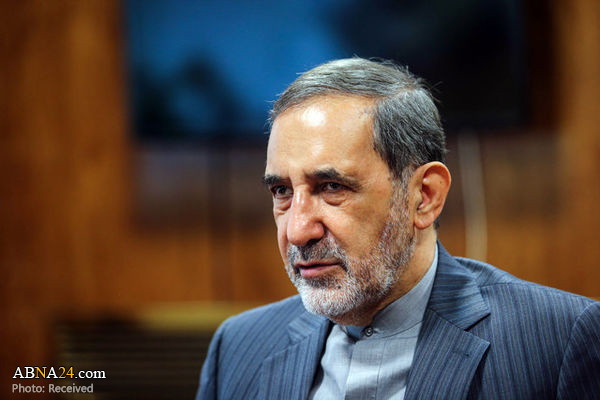- صفحه اصلی
- درباره همایش
- کمیته های علمی
- برگزارکنندگان و حامیان
- فراخوان ها
- فراخوان علمی همایش
- فراخوان کنگره شعر
- اخبار و گزارش ها
- اخبار همایش
- پیش نشست های علمی
- همایش سه روزه
- برای پژوهشگران
- درباره حضرت ابوطالب
- تراث ابوطالب
- شیوه نامه تألیف مقالات
- شعر و ادب
- نوحه
- چند رسانه ای
- دانلود پوستر و بروشور
- گالری تصاویر
- دانلود ویژه نامه ها
- ارتباط با همایش
- نشانی دبیر خانه
- ارسال مقالات
Iran's Velayati: Snapback mechanism piece of US propaganda
Washington’s push to trigger the snapback mechanism of the JCPOA for re-imposing sanctions on Iran is nothing but an attempt to attract the American public attention as part of a propaganda game, Iranian official Ali Akbar Velayati said.
Washington’s push to trigger the snapback mechanism of the JCPOA for re-imposing sanctions on Iran is nothing but an attempt to attract the American public attention as part of a propaganda game, Iranian official Ali Akbar Velayati said.
In an interview with Tasnim, Velayati slammed the hype over the so-called snapback mechanism of the 2015 nuclear deal as a propaganda game.
Pointing to the US administration’s attempts to attract the public opinion after Donald Trump's plummeting poll numbers, the member of the Iranian team of JCPOA observers lashed out at the US for reneging on the nuclear deal and refusing to lift the sanctions.
“A one-sided JCPOA has no validity,” Velayati added.
Asked about Iran’s reaction to a possible activation of the snapback mechanism, he said the US, which has already withdrawn from the deal, has no right to make any comment or trigger the mechanism.
On the expectations that Joe Biden would win the US presidential election, Velayati said the weakest diplomacy taken by a country is to pin hopes on the fate of other states, stressing that the Iranian authorities do not care who the next US president will be.
Last month, 13 countries of the 15-member council rejected the US push to trigger the snapback provision in the 2015 nuclear deal, leaving Washington isolated on the issue.
UNSC Resolution 2231, which enshrined the JCPOA, states that if no council member has put forward a draft resolution to extend sanctions relief on Iran within 10 days of a non-compliance complaint, then the body’s president shall do so within the remaining 20 days.
The document, however, says the Security Council would “take into account the views of the states involved.”
US Secretary of State Mike Pompeo has claimed that all UN sanctions against Iran will be reinstated on September 20 after the US “activated the snapback mechanism.”
However, the claim was strongly condemned by other signatories of the nuclear deal including the EU, Russia and China.
Washington’s push to trigger the snapback mechanism of the JCPOA for re-imposing sanctions on Iran is nothing but an attempt to attract the American public attention as part of a propaganda game, Iranian official Ali Akbar Velayati said.
Washington’s push to trigger the snapback mechanism of the JCPOA for re-imposing sanctions on Iran is nothing but an attempt to attract the American public attention as part of a propaganda game, Iranian official Ali Akbar Velayati said.
In an interview with Tasnim, Velayati slammed the hype over the so-called snapback mechanism of the 2015 nuclear deal as a propaganda game.
Pointing to the US administration’s attempts to attract the public opinion after Donald Trump's plummeting poll numbers, the member of the Iranian team of JCPOA observers lashed out at the US for reneging on the nuclear deal and refusing to lift the sanctions.
“A one-sided JCPOA has no validity,” Velayati added.
Asked about Iran’s reaction to a possible activation of the snapback mechanism, he said the US, which has already withdrawn from the deal, has no right to make any comment or trigger the mechanism.
On the expectations that Joe Biden would win the US presidential election, Velayati said the weakest diplomacy taken by a country is to pin hopes on the fate of other states, stressing that the Iranian authorities do not care who the next US president will be.
Last month, 13 countries of the 15-member council rejected the US push to trigger the snapback provision in the 2015 nuclear deal, leaving Washington isolated on the issue.
UNSC Resolution 2231, which enshrined the JCPOA, states that if no council member has put forward a draft resolution to extend sanctions relief on Iran within 10 days of a non-compliance complaint, then the body’s president shall do so within the remaining 20 days.
The document, however, says the Security Council would “take into account the views of the states involved.”
US Secretary of State Mike Pompeo has claimed that all UN sanctions against Iran will be reinstated on September 20 after the US “activated the snapback mechanism.”
However, the claim was strongly condemned by other signatories of the nuclear deal including the EU, Russia and China.




